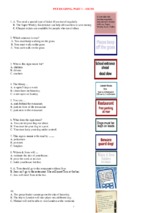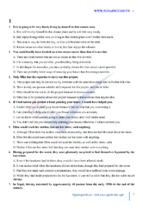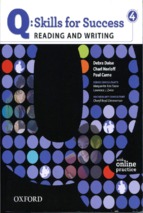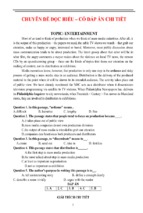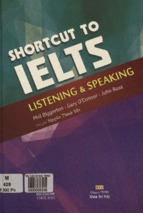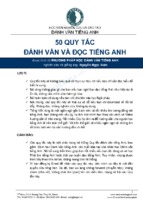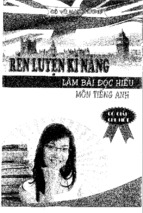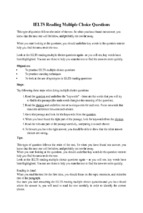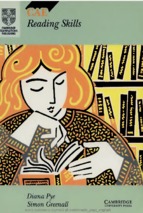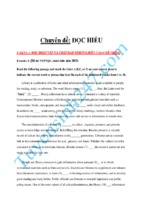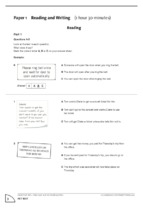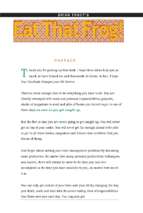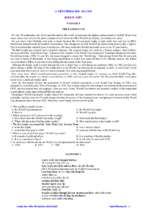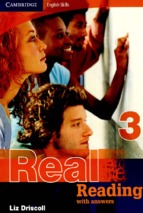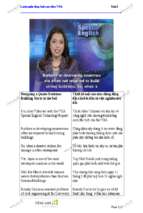The Dead of Jericho
Morse is introduced to Anne
'Looks good, doesn't it?' he said to her.
'Hungry?' she asked, turning towards him. Now that he
was close she looked more attractive than ever, with her
wide brown eyes, clear skin and generous mouth.
'A bit,' he answered.
'You probably eat too much,' she said, laughing, and put
her hand lightly on his stomach. Things were going well, he
thought. But as he watched her slim figure turn and bend
over the food, he suddenly felt depressed and hopeless. After
all, he was fifty and going bald and she was more than ten
years younger. It was time he stopped chasing women.
He decided to sit and eat in peace, and found a place
alone at a table. A minute later he was surprised to see her
coming towards him.
'Do you mind if I join you?' she asked. 'Not at all,' he
answered. 'I just thought you'd prefer to find someone
younger to spend the evening with.' 'They're all very
boring.' She raised her glass to her lips. 'Well, I'm just the
same as all the others,' he replied.
'What do you mean?' she asked. Their eyes met again.
'I find you very attractive, that's all,' he said quietly. She
did not answer, and they both went on eating silently.
'You know,' she said, 'when most men say that, it just
means they want to have sex.'
'There's nothing wrong with that, is there?'
'Of course not! But that's not the only thing, is it? I mean,
you can like a woman for what she is, not just what she
looks like, can't you?'
'I don't know much about women,' he said sadly. But her
hand reached for his under the table, and held it.
/ find you very attractive, that's all,' he said quietly.
3
The Dead of Jericho
Morse is introduced to Anne
'Look,' she said, 'let's forget about the other guests. Why
don't we just sit here together all evening?'
'Why not indeed!' he said. 'Now, have some more wine,
and tell me a bit about yourself.'
She told him she had studied modern languages at
university, and then worked as a foreign sales
representative for a small publishing company in Croydon,
which was managed, by two brothers. She had travelled on
business (and pleasure!) with one of the brothers. She had
stayed in that job for eight years, as the company got
bigger and her own salary rose. And then she had left.
'Why?' he asked sharply.
'I'm not sure. I just wanted a change. So I took a job
teaching German in a very large school in the East End of
London. But I found it so difficult trying to teach children
who just weren't interested in school! And the other
teachers, well, the men were a bit too interested in me! So
I left after a year or so. In the end I came back to Oxford,
advertised for private students, bought a little house, and
here I am!'
She had missed out something, he thought. Hadn't Mrs
Murdoch said she was married? And there were other
holes in her story. But he said nothing, just sat there
drinking and looking at her happily. It was a few minutes
after midnight and some of the guests were already
leaving.
'What about you?' she asked him.
i'm not as interesting as you are,' he said. 'I just want to
go on sitting here with you.' He was beginning to sound
rather drunk, but the woman felt strangely interested in
him. They were holding hands again, and talking like old
friends.
At twenty past one the phone rang, and Mrs Murdoch
came to say it was for him. He went to the phone in the
hall.
'What? Lewis? What the hell do you have to — ? Oh.
Oh, all right. Yes! Yes! I said so, didn't I?' He banged
down the phone and returned to the woman.
'Anything wrong?' she asked, a little worried.
'Not really, it's just that I've got to leave, I'm afraid —'
'But you've got time to take me home, haven't you?
Please!'
'I'm sorry, I can't. You see, I'm on call tonight and —'
'Are you a doctor?'
'I'm a policeman.'
'Oh God!'
'I'm sorry —'
'Don't keep saying you're sorry!' There was a moment
of silence, then she said, 'No, I'm sorry, for getting cross, I
mean. It's just that ... I wanted . . .' She looked up at him
with disappointed eyes. 'Perhaps it's fate . . .'
'Nonsense! There's no such thing!'
'Don't you believe in fate?'
'No! Look, when can we meet again?' he asked
urgently. She wrote her address quickly on a piece of
paper - 9 Canal Reach - and gave it to him. He took it, and
turned to leave. But he had to ask the question he'd been
thinking about all evening.
'You're married, aren't you?'
'Yes, but—'
'To one of the brothers in the Croydon company?' She
paused a moment before answering. 'No, I was married
long before that. I was silly enough to marry when I
The Dead of Jericho
The first death in Jericho
was nineteen, but —'
Just then a tall, youngish man entered the room,
walked towards them and said, 'Ready, sir?'
'Yes.' He turned and looked at her for the last time,
wanting to say something, but unable to find the words.
'You've got my address?' she whispered.
'Yes, but I don't know your name,' he replied.
'Anne. Anne Scott. What's your name?' she asked.
'They call me Morse,' said the policeman.
centre are visited by large numbers of tourists. Unfortun-
'Where are you taking me to, Lewis?' Morse asked, as the
police car drove fast through the streets of Oxford.
'Out of town, sir, Kidlington. A man's stabbed his wife
there. He came into the police station and admitted it.'
'It doesn't surprise you, Lewis, does it? In most murder
cases there's an obvious person to accuse right from the
beginning. Usually he's arrested close to where the murder
happened, and in about 50% of cases he and the murdered
person knew each other well.'
'Interesting, sir,' said Lewis politely. ''By the way,
Lewis,' said Morse, 'where's Canal Reach?'
'It's in Oxford, sir, near the canal, down in Jericho.'
The first death in Jericho
Oxford is one of England's most beautiful cities. The
fine old university buildings and churches in the town
ately, many ancient streets of houses have been destroyed to
provide modern shops and offices. However, there is a part
of Oxford where there are hardly any new buildings, and
where people live undisturbed in their old houses as they
have always done. This area, in the north-west of the city,
between Walton Street and the canal, is called Jericho. Its
houses are small and narrow, and were built for factory and
railway workers over a hundred years ago. Not many
tourists find their way to Jericho.
On Wednesday October 3rd, about six months after Mrs
Murdoch's party, Inspector Morse was driving through
Oxford. As he turned into Walton Street he suddenly
realized he was in Jericho, and immediately thought of Anne
Scott. He had not forgotten her, of course not, but an affair
with a married woman had seemed rather complicated
when he had considered it the morning after the party, so he
had not contacted her. But he was thinking of her now . . .
It was his free afternoon and he had a special reason for
coming to this part of the city. As a member of the Oxford
Book Club he had been invited to a talk on English poetry,
to be given that Wednesday evening by a well-known
Oxford professor. The Book Club had also arranged a
second-hand book sale just before the professor's talk, and
asked members to provide books to sell. So Morse was on
his way to deliver some of his old books to the Club's
address in Walton Street. It was 3.25 p.m.
But something made him decide to turn off Walton Street
and drive slowly towards the canal. Surely Canal Reach
must be very close? The narrow streets made parking
The Dead of Jericho
Hanging at the bottom of the stairs he saw an expensivelooking brown leather jacket, still wet from the rain. But
although he listened very carefully, he could hear nothing.
Why had she left the door unlocked? But he often forgot to
lock doors himself. As he closed the door quietly behind him
and stepped onto the wet pavement, he looked up at the
house opposite, number 10, and was surprised to see a tiny
movement of the curtains at the upstairs window. Was he
being watched? Turning back to look at Anne Scott's house,
he thought warmly of the woman he would never see again ...
It took him some time to realize that the light upstairs had
been turned off. There was somebody in Anne's house.
The professor's excellent talk on English poetry that evening
was obviously enjoyed by the Oxford Book Club members.
Morse clapped loudly too, and promised himself he would
read more poetry and come to more talks like this.
Discovering more about language, poetry and music, that's
what's really important in life, he thought. He decided to
have a drink in the members' bar before going home.
Perhaps his friend the chairman would join him.
Sitting there alone with his beer, he heard the siren of a
police car or ambulance outside in Walton Street. A traffic
accident somewhere, perhaps.
'You look lonely. Do you mind if I join you?' She was a
tall, slim, attractive woman in her early thirties.
'Delighted!' said Morse. They talked about the professor,
and poetry, and Morse, looking into her large bright eyes,
hoped she would not go away.
'You're Inspector Morse, aren't you?',she said, smiling.
The first death in Jericho
'How did you know?' he asked, surprised.
'I'm the chairman's wife,' she laughed.
Married! thought Morse, disappointed. Another siren
sounded from Walton Street. The chairman called from
the bar, 'I'll bring you another beer, Inspector.' And when
he arrived with the drinks he said, 'There's a bit of trouble
near the canal. Police cars, ambulance . . . Something's
happened.'
But Morse was no longer listening. 'They may need me,' he
said, and leaving his second beer untouched, he walked quickly
out. His throat was dry and he wanted to run. But somehow
he knew that he was already much too late. Perhaps he had
always been too late. And as he turned into Canal Street,
there, ahead of him, stood an ambulance and two police cars.
He explained who he was to the policeman guarding the
entrance to Canal Reach, and was allowed to pass.
Inside number 9 the sitting room looked almost the same
as he had seen it earlier. This time there was no jacket on the
stairs. In the room was a young policeman, Constable
Walters.
'Who's investigating this?' Morse asked him.
'Inspector Bell, sir. He's in the kitchen, with the body.'
Morse shook his head weakly and wondered what to do
or say. What could he do? He couldn't help her any more.
'Do you want to see the body, sir?' asked the constable.
'No-o. No, I just happened to be in Jericho .. . Er . . .
How did she die?'
'Hanged herself. Stood on a—'
'How did you hear about it?'
Phone call from somebody, sir, we don't know who. It's
strange, nobody could see into the kitchen from the back of
10
11
The Dead of Jericho
Suicide or murder?
the house, so how did he know —'
'Did she leave a note or a letter?'
'We haven't found one yet.'
'Was ... er ... the front door unlocked?'
The policeman looked interested. 'It was, sir. We just
walked straight in, and anybody else could have done the
same.'
'Was the door to the kitchen locked?'
'No, sir.'
'Have you moved anything in here?'
'Nothing, sir, well, nothing except the key.'
Morse looked up quickly. 'Key?'
'Yes, sir. It looked quite new. It was lying on the carpet
near the front door. Someone could have pushed it
through the letter box.'
Morse turned to go. That afternoon he had noticed a
large black umbrella near the door. It was no longer there.
'Have you moved anything, constable?' he asked.
'You've just asked me that, sir.'
'Oh yes,' admitted Morse. 'I was just... er ... thinking,
you know.' He opened the front door and hesitated. 'Were
there any lights on upstairs?'
'Oh no, sir. Black as night up there.'
Morse thought of the woman who was now stretched
out on the cold floor of the kitchen. Dead, dead, dead. A
warm, attractive, living, loving woman — why had she
hanged herself? Why? Why? Why?
He felt unable to think clearly, even when he was out in
the narrow street again. Strange, he said to himself,
Walters told me there were no lights on upstairs when
they arrived,
but I saw ... Suddenly he noticed a strong smell of fish. It
me from a basket attached to an ancient bicycle outside
number 10. He pushed through the little crowd of local
people
discussing the death, and found the nearest phone box.
Inside, the phone book was open at the page for POLICE.
This must be the phone box the unknown person had used
to report Anne's death. As he bent over the book, he knew
he was right. There was the smell of fish.
He walked quickly away from Jericho and all the way
home to his flat in North Oxford, where he sat miserably
without moving for an hour. Then he listened to his
favourite piece of Mozart. Sometimes the beautiful music
made him forget crime, and death, and sadness. But not
tonight.
12
Suicide or murder?
I
nside 9 Canal Reach, Constable Walters entered the
kitchen.
Inspector Morse was here a few minutes ago, sir,' he said
to Inspector Bell, a tall, black-haired man. 'What the hell
did he want?' asked Bell crossly.
'He just asked a few questions, sir. Do you know him
well?'
'
I suppose so. We've worked together once or twice. He's
a strange man, bloody strange.'
13
The Dead of Jericho
'People say he's clever.'
'Yes, that's right.' Bell was an honest man. 'Cleverest
detective I've ever met. Cleverer than most of us anyway.'
'He never married, did he?'
'Too lazy for that. Likes spending his free time in pubs, or
listening to Mozart!' Bell laughed. Then he stopped and
looked sharply at Walters. 'Now perhaps you'd like to tell
me exactly what questions he asked?'
As Walters repeated Morse's questions, Bell listened
carefully. Of course it was strange that the front door wasn't
locked, and he still didn't know who had rung the police.
But he had only just started investigating the case. He would
know more details soon. Anyway, details were not really
necessary, because it was a simple case of suicide. She had
hanged herself by attaching a rope to the ceiling, standing
on a chair and kicking it away. As an experienced police
officer he had seen many suicides like this. Perhaps when his
men searched the house they would find a note explaining
why she had killed herself. There was only one thing that
worried Bell, and he hadn't told the police doctor or Walters
or any of his men about it. How does a woman, at that
terrible fatal moment, kick the chair away so that it lands
almost two metres away from her? But it didn't really
matter, he told himself. He was sure it was suicide.
Bell did not find the suicide note he was looking for. But
there was at least one note which Anne Scott had written the
night before she died — a note which was delivered and
received.
From number 10 Canal Reach, George Jackson continued
14
Suicide or murder?
watch the house opposite. He was sixty-six, short
and thin with watery blue eyes. When he lost his factory
job, he
had moved here. Although he had no real friends, most
people in Jericho knew him, because he was good with his
hands and did odd jobs for his neighbours.
He did not often drink much, but that Wednesday
evening he stood in his dark front room drinking whisky.
He knew he could not be seen, standing right at the back of
his room, with no lights on. The two fish he had caught that
morning were in the kitchen, but he wasn't hungry. He saw
the police arrive, then a doctor, then two more policemen,
then a man of about fifty who was going bald. A man he had
seen before, that very afternoon, at about 330, entering
number 9. Jackson watched, drinking his whisky, and
feeling much less anxious than a few hours earlier. Only one
thing worried him — had anyone seen him then? Anyway he
had invented a clever little lie to protect himself. He finished
his bottle of whisky and went on watching until the police
finally left.
to
Earlier that Wednesday evening, in an expensive, wellfurnished house in Abingdon, a small town near Oxford,
Celia Richards heard her husband's car arrive. He was very
late, and dinner had been ready for a long time.
'Hello, darling, sorry I'm late.'
'You could have phoned me to tell me you'd be late.'
'I just said I was sorry, darling, didn't I?' He sat down and
Put a cigarette in his mouth.
'You're not going to smoke that just before we eat, are
you?'
15
The Dead of Jericho
Suicide or murder?
George Jackson continued to watch the house opposite.
'Oh all right.' He put the cigarette back into its packet.
'But there's time for a drink, isn't there? What would
you
like?' Celia suddenly felt better, and - yes! - almost glad to
see
him again. She'd already had two large drinks herself.
'You sit down, Charles, and have that cigarette. I'll get the
drinks.' She forced herself to smile at him while handing him
his whisky. 'Did you see Conrad today?' she added.
'Conrad?' Charles repeated. He seemed to be thinking of
something else.
'Yes, Charles, your brother Conrad. You do work with
him, don't you?' she replied sharply.
'Oh, Conrad! Sorry, darling. I'm a bit tired, that's all.
Conrad's fine, yes. But our meeting finished at lunch-time,
and then I had some . . . er . . . rather difficult business to
complete.'
Celia was no longer interested. She sat there with her
drink, an attractive, rich woman in a cloud of unhappiness.
She knew, she was almost sure, that Charles had affairs with
other women. Had he been with another woman today? She
had so much to worry about. And the worst thing was
knowing it was her fault that Charles needed other women.
She had never been interested in sex, and somehow they had
never seriously considered having children. She would be
thirty-eight soon. It was really too late now.
On her way to the kitchen, she saw Charles's large black
umbrella near the front door. She put it back where it was
always kept, in the Rolls Royce, parked outside the house.
By 8 30
- they had finished their dinner. Celia had not
spoken at all during the meal. Her head was full of wild
16
17
The Dead of Jericho
thoughts, and the person she was thinking of was her
husband's brother, Conrad.
It was at 9.15 that evening that an unknown person rang the
police and told them to go to Anne Scott's house in Jericho.
At exactly the same time that Inspector Bell and Constable
Walters were discovering Anne's body, Edward Murdoch,
the younger of the two Murdoch brothers, was reading in
bed, in the house where Morse had first met Anne Scott. The
book he was reading was by Kafka, in German. Although
Edward was not very good at German, he had shown great
interest in the language since starting private lessons with
Anne Scott. Now he put the book down, turned the light off,
and began to think about her. Had his brother Michael
really had sex with her? That's what Michael said, but he
didn't always tell the truth, and Edward would never have
believed it — until last week. For the hundredth time he
remembered those few exciting moments . . .
When he arrived at her house for his lesson last
Wednesday afternoon the front door was locked, which was
unusual. He had to knock, and she appeared at the door in
her night clothes.
'Edward! Come in! I'm sorry, I was asleep!' Her long hair
fell to her shoulders, and she was smiling at him. Could it be
that she was happy to see him? She held his arm and took
him upstairs to the back bedroom, where he always had his
lessons.
'I'll be very quick, I promise,' she said, laughing, as she
ran into the front bedroom. Edward's mouth felt dry.
18
Suicide or murder?
A few minutes later he heard her call.
'Edward? Edward? Can you come here a minute?'
Her bedroom door was half open, and the boy stood by it,
hesitating. He would never forget how she looked. She was
standing near a large double bed, and all she was wearing
as a grey skirt. He could not take his eyes off her beautiful
body. 'Haven't you seen a woman's body before, Edward?'
she
laughed. 'Be a darling, and help me fasten this skirt.' He
managed to do it, his hands clumsy and trembling.
'Thank you, now go and read some German. I'll be with
you soon,' she said. He tried hard to concentrate on Kafka
for the rest of the lesson. That was a week ago. He had been
looking forward to his
2.30 lesson with her today, but at about 7.30 this morning a
letter had been delivered, by hand, addressed to him. It said:
It was disappointing, but in a way it was exciting
too. Perhaps next week he could call her Anne? He'd
always
19
The Dead of Jericho
called her Miss Scott up to now. He did not understand how
final it was.
When Morse woke up next morning, Thursday October
4th, he suddenly remembered he had left his car in Jericho.
'Bloody hell!' he said, and rang up Sergeant Lewis, who
came to collect him and drive him to Walton Street. There
they found Morse's car where he had parked it for the
Oxford Book Club talk. Parking problems! thought Morse.
It gave him an interesting idea.
Walters investigates
C
onstable Walters and Inspector Bell searched the two
small bedrooms of 9 Canal Reach, looking for clues.
They found large piles of letters in the drawers of a
desk. Anne had obviously tried to arrange them in some
kind of order. They spent some time looking through the
letters, but in the end Bell only seemed interested in three
things, a recent letter from Anne's mother, an addressbook, and a desk diary.
This should be helpful!' he said, handing the diary to
Walters. He pointed to the page for Tuesday October 2nd:
'Summertown Bridge Club 8 p.m.,' and then to the page for
the next day, Wednesday October 3rd, the day of Anne's
death: 'E.M. 2.30.'
20
Walters investigates
Next day Walters, who had been told to discover as much
as possible about Anne's life, returned from his
investigations to report to Bell. He was rather pleased
with himself for folding so many details about her.
She had studied hard at school, and been intelligent
enough to get a place to study modern languages at one
of the famous Oxford colleges. Unfortunately she had
fallen in love with another student, John Westerby, fallen
into bed with him and become pregnant. Her father, a strict
man, refused to see her ever again, and died soon afterwards, but Anne and her mother were still in contact. John
and Anne were married, and then they left Oxford for a long
summer holiday. During that time the young couple must
have decided not to have the baby, as there was no sign
of a baby when they returned. They separated almost
immediately. After that Anne's working life was easy to
follow. It was as she had explained to Morse. John
Westerby had been killed in a car crash near Oxford about a
year ago.
Bell was listening as Walters finished his report, but he
was busy and didn't have time to worry about the past life
of a woman who had stopped herself ever feeling miserable
again. He knew, however, that there would be questions to
answer at the inquest. Why had she done it? Was anything
worrying her? Bloody stupid questions! Of course something
was worrying her! Everybody was worried about something,
health, money, sex, family ... Bell shook his head sadly. The
real mystery to him was why so many people went on with
life, uncomplaining.
'Have you discovered who E.M.is yet?' he asked.
21
The Dead of Jericho
Walters investigates
'No, sir,' answered Walters, obviously disappointed
Anne used to give several private lessons a week, but she
kept no list of names, and the neighbours were not sure they
would recognize any of her visitors.
'Forget it, Walters,' said Bell, smiling. 'Perhaps it was the
Electricity Man! Let me tell you something. That woman
killed herself. I know. I've been finding suicides like that for
the last twenty years. So, why did she do it? Well, we'll
never be sure. People get unhappy, you know. Don't think
that life is wonderful, because it isn't. It's bloody awful.
There are crashes and wars and earthquakes and diseases so don't be surprised if you find one or two people who feel
life's too much for them!'
The young constable wondered whether Morse would
investigate this case more carefully than Bell. He looked at
his boss.
'And if you're worried about it,' continued Bell, noticing
the look, 'you go and find some more information. And find
some witnesses for the inquest too, would you?'
So Walters went back to Canal Reach that afternoon.
Morse's question about Anne's front door was still worrying
him. Next to number 9 was number 7, where a grey-haired
old woman lived alone.
'I just wondered if Anne Scott ever left a key with you,
Mrs Purvis?' he asked politely when she opened the door to
him.
'Yes, er, she did, about a year ago. She never asked me for
it, but I expect she thought it'd be useful if she lost hers.'
Was Mrs Purvis hiding something? She didn't seem very
confident. Walters took Anne's key away with him. He now
had three keys to Anne's front door. The second was the
new one which had been discovered inside the front
door, probably pushed through the letter box. And the
third was the one which Anne herself must have used, and
which she'd kept in the sitting room.
The locksmith who had a shop in Walton Street remembered cutting two new keys for Anne Scott nearly two
years before. 'How many keys do you get when you buy a
house in this
area?'
'Two, usually,' answered the locksmith.
'So in the end she had four keys,' said Walters slowly.
'It would be more accurate to say that she had four keys
at one time, wouldn't it, constable?' replied the locksmith.
Walters was beginning to dislike the man.
'Anything else you should tell me?' he asked sharply.
The locksmith said nothing until Walters was almost out
of the door and then - 'Somebody in Canal Reach knows
something about those keys. Try number 10.'
Interesting, thought Walters, as he walked back to
number 9 and used Mrs Purvis's key to open the door. From
the kitchen window he could see that the wall between the
back garden and the canal had recently been repaired. He
went up to the front bedroom and stepped right in front of
the window. He was delighted to see a tiny movement of the
curtain at number 10, opposite. So Anne's bedroom was
being watched!
It was clearly important to visit number 10. He went
straight downstairs and across the road to interview George
Jackson.
22
23
The Dead of Jericho
'Did you know Anne Scott well, Mr Jackson?'
'Not really. Nice woman, but I never knew much about
her.'
'Did she ever leave her key with you?' Walters wondered
if he could see fear in Jackson's cold eyes. The man
hesitated.
'Well, yes, she did. I did a few odd jobs for her, you know.
So even if she wasn't in, I could go into her house any time.'
'Was it you who repaired her garden wall?'
This time Jackson certainly wasn't afraid, he was proud.
'You saw that?' His small face shone with pleasure. 'A
neat little job, wasn't it? I finished on Tuesday afternoon.
You can ask Mrs Purvis if you don't believe me. She saw me
in Miss Scott's back garden. You ask her!' Jackson looked
confident now. Walters felt sure he was telling the truth.
'So you've still got the key?'
'No, I forgot to give it back to Miss Scott when she paid
me on Tuesday afternoon. But I remembered on Wednesday,
so when I got back from fishing in the morning, I took it
over to her house in the afternoon —'
'You did?' Walters felt strangely excited.
'And I just put it through the letter box,' finished Jackson.
'Oh.' So it was all very simple. How disappointing. But
there were other questions to answer. 'Was the door
unlocked?'
Jackson thought for a moment. 'I don't know,' he said. 'I
didn't try to open it.'
'Perhaps, Mr Jackson, you saw someone else going into
number 9 sometime in the afternoon?'
'I'm getting old, I don't remember things as well as I used
24
' replied Jackson. 'But I think there was someone. Yes, he justt
walked in, and then a few minutes later he walked out.' 'What
was he like?' asked Walters eagerly. 'Never seen him before.
About fifty, going bald.' Walters needed time to think
about this new clue, but Jackson did not stop. 'But I think I
saw him later.'
'What!'
'He went in there while all the police were there, after
they found the body. You let him in yourself, I seem to
remember. So he must be a policeman, mustn't he?'
After Walters had left, Jackson sat in his tiny kitchen,
drinking tea and feeling very pleased with himself. He was
sure the policeman had believed him. Anyway, he had told
the truth, at least about the key. His plan was very
successful so far.
Later that day, in his interview with the secretary of the
Summertown Bridge Club, Mrs Gwendola Briggs, Walters
discovered that Anne had been a member for six months.
She hardly ever missed their regular bridge evening on
Tuesdays. Last Tuesday she had played with Mrs Raven, old
Mr Parkes and young Miss Edgeley, and they had finished
late, at 2.45 in the morning.
But unfortunately none of these three had any more
information to offer. In bed that night Walters thought hard
about the case. It certainly seemed to be suicide, but he had
round no reason for it yet. And how had Anne Scott gone
home after playing bridge, the night before her death? By
taxi? By bicycle? With someone? According to the medical
Port, she had been dead for about ten hours by the time
25
The Dead of Jericho
the police found her. Why was her front door unlocked?
Had she forgotten to lock it? Anne had her own key, Mrs
Purvis had one, and Jackson . . . Jackson could have
unlocked the door with his key, walked in and discovered
the body in the kitchen! He could have moved the kitchen
chair too. But why hadn't he phoned the police immediately,
from number 9? Did he feel guilty? Perhaps he stole
something, perhaps there was money lying around in the
kitchen. And what about that other mystery, Morse? It must
have been Morse who Jackson had seen coming to the house
in the afternoon. Why had he come? Was he taking German
lessons with Anne? Walters remembered Morse's question
that night. 'How did she die?' Surely nobody had told him it
was a woman who was dead. So how did he know that?
Suddenly Walters jumped out of bed, ran to the phone
book and turned the pages rapidly until he came to the Ms.
There it was, in black and white. 'Morse, E.' Was Morse the
'E.M.' who Anne had been expecting that Wednesday
afternoon at 2.30? Perhaps Morse had a key to number 9
too. If he, not Jackson, had walked in and discovered the
body in the kitchen, why hadn't he reported it?
Walters found it difficult to sleep that night. It was a
serious thing to accuse an experienced police officer of not
reporting a crime. But what was worrying Walters was that
Inspector Morse could be guilty of something even worse.
It was not only Walters who had difficulty in sleeping that
night. Charles Richards could not sleep either. He could not
stop thinking of the stupid mistake he had made. When his
wife Celia saw that long blonde hair on his dark-brown
26
Walters investigates
acket, he should have simply laughed about it. Instead, he
invented a long, complicated explanation, which she obviously
did not believe. He remembered seeing the anger and
jealousy in her face. In the past she may have guessed about
his love affairs, but now she knew the truth. He felt guilty
and depressed. He was growing old, losing his hair, losing
his teeth, and now losing his wife too. He was drinking and
smoking too much, and having sex too often . . . How he
hated himself sometimes!
Still feeling tired, he got up early, and drove to his office in
the centre of Abingdon, even though it was Saturday
morning. He and his brother Conrad usually spent some
time in the office at the weekend, discussing business
together. But today Charles told his secretary that he did not
want to be disturbed, and, smoking cigarette after cigarette,
sat at his desk, feeling sorry for himself and wishing he
could change his character. Why didn't he stop smoking?
Why didn't he stop having girlfriends? How could he go on
hurting his wife Celia like this?
At 10.15 he decided to talk to Conrad. They had always
been good friends, and Conrad, younger, kinder and more
serious than Charles, had always been very understanding
about his brother's many affairs. Charles rang Conrad at
home.
'Not coming to work today, Conrad?'
'I'm just off on that business trip you arranged, remember?'
'Oh, I'd forgotten. Look, Conrad, can you ... er ... help
me?'
'Again?'
'This is the last time, I promise. You see, I'd ... I'd like an
27
The Dead of Jericho
Walters investigates
alibi for yesterday afternoon.'
'That's the second time this week!' Conrad sounded
unusually cross.
'I know, but I promise it won't happen again.' 'All right.
What do you want me to say if Celia asks?' 'Say we were
in London all afternoon on business. I . . . w e . . . er . . .
finished at about six o'clock.' 'I see.'
'She may not ask, you know.'
'Don't worry, Charles, I'll do it. Look, I must go.' 'Of
course. Have a good day! And, Conrad, thanks!' As soon
as Charles had put his phone down, it rang. 'Hello?' he
said. 'Charles Richards here.' 'Charles.' It was a woman's
voice, warm and deep. 'No need to sound businesslike
with me, darling.'
'Jenny, I told you not to ring me at work,' he said angrily.
'What do you want?'
'I want you, darling,' she answered. 'My husband has just
rung. He's staying abroad for another week! So shall I
expect you at 1.30 or 2.00 this afternoon, darling?'
'Look, Jenny, I . . . I can't see you today. You know that.
It's impossible on Saturdays. I'm sorry, but —'
'Never mind, darling. Don't be so cross! We can see each
other tomorrow.'
i'm sorry, but I can't see you again for a while, Jenny. It's
too dangerous. Yesterday —'
'What the hell do you mean?' The woman was angry
now.
Charles felt desperate as he thought of her long blonde
hair falling on to her bare shoulders.
'Look, Jenny,' he said softly, 'I'll explain —' 'Explain?
What the hell is there to explain?' And the line went dead.
Charles looked miserably at the silent phone.
28
On that day, Saturday October 6th, the death of Anne Scott
was reported in a local Oxford newspaper. Many people
read about it, including the Murdoch family, George
Jackson, Mrs Purvis, Conrad Richards, Constable Walters
and Inspector Morse. Charles also read about it, quite by
chance. His wife brought home a copy of the newspaper,
and left it on the table near him. He realized that she must
have read the report of Anne's death.
The inquest on Anne had been arranged for the following
Tuesday, October 9th. Constable Walters was asked to
describe finding the body. The police doctor said in his
report that the woman had probably died between 7.00 and
9.30 on the morning of Wednesday October 3rd, that she
was perfectly healthy, and that she was 8-10 weeks
pregnant at the time of death. This interesting fact caused a
little surprise in the room, but finally it was decided,
as expected, that she had killed herself. The case of Anne
Scott was officially closed.
But that evening Morse telephoned the police doctor. 'Have
a drink with me later, Max.' 'No thanks, I drink at home
these days. Much cheaper.' 'Just tell me, did the Scott
woman kill herself?' 'Morse, I only look at the body,
and tell you how she died. It's not my job to discover why
she died.'
'Come on, Max. I need to know the answer.
suicide?'
The Dead of Jericho
Morse investigates
There was a long pause. The doctor clearly did not want to
answer. 'Yes,' he said in the end.
with a key which would fit the back door of number 9. He
hoped the locksmith wouldn't tell anyone about this,
but he
couldn't be sure. It was all very risky. It wasn't his case,
and he had no good reason for being in Anne's house,
especially at night. If anyone saw him . . .
Morse investigates
On Saturday October 13 th, four days after the inquest,
Morse interviewed most of Anne's neighbours in Canal
Reach. Some of the information he received was useful, but
he decided that he really needed to search Anne's house for
clues. The best time would be at night, when the neighbours
wouldn't see him go in.
So he went to the locksmith in Walton Street (where
Walters had been, although Morse was not aware of this). He
explained that he was a police inspector, and needed to get
into number 9 Canal Reach (which was quite true), but that
he had left his key at the police station (which, of course, was
quite untrue). Unfortunately the locksmith had no key to fit
the front door.
'But I must get in there,' said Morse. 'The truth is that the
sergeant has stupidly lost both the keys —'
'You mean three keys, don't you, inspector?' interrupted
the locksmith, going on to tell a surprised Morse about his
earlier visit from Walters. Morse listened, and learned - and
wondered.
'But I didn't tell the constable about the back door key,'
continued the locksmith. 'He didn't ask.'
So two minutes and one £5 note later, Morse left the shop
30
It was the same morning, Saturday October 13th, that
Charles Richards received the letter at his house in Abingdon.
It had been delivered to the wrong address, because on the
envelope was written 61 (instead of 261) Oxford Avenue,
Abingdon, near Oxford. Probably the person who lived at
number 61 had received it, realized the mistake, changed the
number to 261, and posted it again. The envelope was clean
and white, with 'Private' written at the top. The writing
looked rather childish. Inside was another envelope, with
'Charles Richards' written on it. He took out the single piece
of paper. It had no address, date or signature. He read:
The Dead of Jericho
Although it was badly written, and the writer could not spell
'believe' or 'watching', the message was surprisingly clear.
Charles read the letter several times, but remained calm. He
took Celia's breakfast up to her room, kissed her lightly on the
forehead and told her he was going into Oxford for the morning.
Celia Richards said nothing. As she heard him drive
away, her head was full of the report she had read in the
local newspaper, the report of Anne's death. She felt sure
Charles had read it too. Was her husband responsible for
that terrible death? She didn't even care very much any
more. What she was sure of, was that they couldn't simply
go on living together like this. When he came home today
she would tell him, tell him everything she knew, tell him the
truth. Conrad had advised her not to, but it was the only
way. Oxford .. . Why was he going to Oxford this morning?
He usually went to the office in Abingdon on Saturdays.
Anne Scott was dead, so he wasn't visiting her. What reason
could he possibly have for going to Oxford?
At the local hospital a patient was lying in bed, unconscious.
A doctor was examining him.
'He's a bloody fool!' said the doctor to the nurse who was
looking after the young man. 'Taking drugs is just stupid!'
'Will he be all right?' she asked.
'Perhaps, perhaps not. If he recovers, it'll be because of
you, nurse, no one else.' The nurse felt pleased, and a little
more hopeful than before. She was beginning to like her
patient, Michael Murdoch. He was only nineteen, the same
age as her. It would be so sad if he died.
32
Morse investigates
That night Morse carried out his plan. He walked rapidly
along Canal Reach to the canal at the end. There were no
lights on at number 9 or number 10. It was just before
9 p.m., and quite dark. Turning left at the water, he walked
along beside the low wall between the canal and number 9,
and jumped quickly over into Anne Scott's back garden. He
waited for a moment to check that the neighbours had not
heard him, but all was quiet. He used the locksmith's key to
open the back door. He did not dare turn on any lights, or
go into the bedroom, in case he was seen, but he spent some
time in the back bedroom looking through the papers in
Anne's desk. Then he noticed she had a whole shelf of books
by classical writers, arranged in alphabetical order. But it
was strange that one of them, by the Greek writer,
Sophocles, was missing.
He went downstairs and stood for a moment in the sitting
room. He suddenly realized how cold it was. There was a
small electric fire upstairs, but down here . . . He saw the
open fireplace and moved towards it. There were still tiny
pieces of burnt paper in the cold fireplace. He managed to
find two pieces of an official letter. The only writing he
could still read said ICH RAT. That could be German,
perhaps, or part of a longer word.
Suddenly, he felt a little afraid. Here he was, in Anne's
house, hiding in the dark like a thief or a criminal. Why was
he behaving like this? He should have admitted immediately
to the policemen investigating the case, Bell and Walters,
that he had come to Anne's house on the afternoon of the
day she died. It was stupid of him to feel guilty about it.
He left the house quickly, locking the back door behind
33
The Dead of Jericho
him, and got over the wall in the same way as before. But as
he walked into Canal Reach, thinking he was safe at last, a
heavy hand fell on his shoulder and a voice said, 'Just keep
walking, will you!'
At about the same time that Morse was entering number
9, Charles Richards was driving slowly along Woodstock
Road in Oxford, past the large attractive houses with their
big gardens. He noticed a phone box in front of one of the
houses, and wrote down the address. Satisfied, he drove
away. His plan was ready.
Morse was surprised to discover that he was being pushed
towards a police car, parked at the end of the street. And as
he reached the car and turned round to see who had caught
him, he found himself looking into the frightened face of a
young constable.
'Oh, it's . . . it's you, Inspector Morse!' gasped Walters,
stepping back in horror.
'Do you often arrest Chief Inspectors, constable?' asked
Morse, no longer afraid, but tired and a little cross.
The two men went to Morse's flat in North Oxford,
where they spent several hours, drinking whisky and sharing
their information about the case. Morse admitted almost
everything, but he did not tell Walters he had bribed the
locksmith to give him a key to the back door of number 9.
Walters confessed that he had suspected Morse of being
involved in the case, and showed him the 'E.M.' page in
Anne's desk diary.
'Well, young man,' said Morse finally, 'you're in a
difficult position, aren't you? You find me, a Chief Inspector,
34
'Just keep walking, will you!'
35
The Dead of Jericho
Morse investigates
in an empty house, the house where a woman has recently
died. You know I have no good reason for being there. So
what do you do?'
i just don't know, sir,' said Walters miserably.
'I'll tell you what you should have done. You should have
asked me how I got into the house. How long have you been
a policeman?'
'A year and a half, sir.'
'You've got a lot to learn. Well, everything that's
happened tonight, including our conversation, must be
reported to Inspector Bell. All right?'
Walters agreed happily. He had been worrying about
that.
'But not yet, Walters. I want to get some more information
first. This case is not an easy one to investigate. Have some
more whisky, and tell me about your plans for the future.'
And so Walters talked eagerly, and Morse listened sympathetically. By the time the young constable was ready to
leave, he had complete confidence in Morse, and was
wishing he could work with him.
On his way out he remembered the question he should
have asked. 'So how did you get into number 9, sir?' he
asked.
'When you've been a policeman as long as I have,
constable, you'll find it's easy to open a door without a key.
You see, if it's a Yale lock, you can push a plastic card, a
credit card, for example, between the lock and the door, and
it opens!'
'But the lock on the back door of number 9 isn't a Yale, is
it, sir? Good night, sir. And thanks for the whisky.'
On Monday October 15th, Mrs Gwendola Briggs, the
secretary of Summertown Bridge Club, was interviewed
again, this time by Morse. She was quite shocked by the
difference between the two policemen. Constable Walters
had asked his questions slowly and gently, but Inspector
Morse had no time to bother with politeness. He asked
question after question, rapidly and coldly, giving her no
time to think. Who came to play bridge that Tuesday
evening, the night before Anne's death? What did they talk
about? Where did they sit? When did they finish? How
many cars were there? So many questions! thought Gwendola.
However, she was certainly able to remember a lot, and
Morse was pleased with the information she gave him. But
he was still trying to remember something himself, something
Anne had told him at Mrs Murdoch's party. He felt sure it
was important. Perhaps Mrs Murdoch would remember.
When he rang at the door of the Murdochs' house, it was
opened by a boy of about seventeen or eighteen.
'Are you Michael?' guessed Morse.
'No, I'm Edward.'
'Oh yes. Is your mother in, Edward?'
'No. She's at the hospital, with Michael.'
'Road accident, was it?' Morse had no idea why he had
thought of saying that, but he noticed the boy looked
uncomfortable.
'No. He's . . . he's been taking drugs. And he's . . . rather
ill'
Morse remembered that Edward was taking his exams
next summer. Was he studying foreign languages?
German, perhaps? Suddenly he realized. 'E.M.' . . . Edward
Murdoch!
36
37
- Xem thêm -

